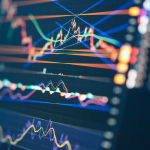Forget the Fantasies and Move Beyond Hype: Debunking 5 Myths About Forex Trading
The tales of faraway traders living lives of adventure as money seemingly fall from the sky have captured my imagination for years. Visions of financial freedom, exotic locales, and a life of endless wanderlust dance in my head as I contemplate navigating the mysterious realm of currencies. But beneath the alluring stories lie many misconceptions.
Becoming a successful forex trader does not happen overnight since Forex is not a get-rich-quick scheme, as some would have you believe. Pursuing this difficult journey requires tremendous patience, persistence, and an optimistic yet realistic mindset.
As a lifelong dreamer who has dabbled in trading currencies for over a decade now, I’ve come to realise that Forex can genuinely reshape your career and life—only if you’re willing to walk an unconventional path, not by chasing easy riches, but by steadily growing your mandated skills, resilience and capital over time.
As many trading gurus have already claimed, your profits arise from seizing the right opportunities, not luck. Luck is merely a pleasant coincidence that sometimes accompanies discipline and diligence, not something that comes to those with a grasping or greedy attitude. Abundance flows naturally to those who approach their work with goals and purposes greater than wealth itself.
And it indeed demands commitment, resilience, and perseverance through inevitable ups and downs. If fortune should smile upon your labour, enjoy the bounty but do not mistake it for the true reward, which lies in the joy of the work itself. The abundance of spirit, not the accumulation of money, is the true wealth that comes to those who pursue their calling with passion, integrity, and an open heart.
Yes, the journey might be unpredictable (and not only for you but everyone around you), yet profoundly rewarding when you begin your journey by grounding yourself in reality and purpose.
So, until your domain with respect, cultivate your seeds with hope and tend your garden passionately, stay curious, keep discovering, and do the next exemplary thing with kindness – and fortune will find you soon. The key is separating fact from fiction.
Forex is a challenging yet rewarding field—if you understand its realities. So here are 5 common myths I see busted through my years of experience:
Myth: Forex is just gambling
The notion that forex trading is simply a form of gambling is a prevalent misconception. While there is definitely an element of risk involved, the seasoned traders I’ve seen succeed over the long run often rely on far more than just luck or random bets.
They stand out for profoundly studying critical market fundamentals and technical indicators and developing specific strategies effectively tailored to their psychology and risk tolerance. And above all, what I love about them is they approach trading with utmost discipline, following a plan rather than just chasing short-term gains.
Don’t get me wrong—lots of gamblers are definitely rolling around in the forex market, just like in any other. But the traders who thrive have a vision, knowledge, and work ethic that separates them from subpar trading folks who view trading as equivalent to spinning the roulette wheel.
For me, Forex has been more akin to a game of chess that intensely tests my wits, patience, and diligence with every single move. Some positions work out perfectly; others don’t even. But it’s okay! By analysing the “board” carefully, planning my strategies intentionally, and managing risk conservatively, I’ve generated decent returns over the past 4 years. No regrets!!
It certainly hasn’t been effortless for me, that’s for sure. There have been plenty of mistakes, losses, and setbacks that occurred along the way. But by taking a learning mindset and treating every trade as a prospect to improve, I’ve managed to gradually/progressively flip the volatile market in my favour.
Myth: You’ll get rich overnight:
I know first-hand that the fantasy of getting rich quickly in Forex is extremely enticing. When I first started trading currencies, all I could think about was making that one massive trade that would transform my life overnight (which I agree is a weird thought). But after many initial losses, I learned the hard way that consistent profits in this market don’t happen by chasing overnight gains.
Yes, I wholeheartedly agree making a significant profit from a single trade is definitely possible in Forex, but it’s also incredibly rare (you might be one of them). More often than not, traders who aim for massive short-term wins end up with massive short-term losses instead.
So, for me, the reality of success has been like a slow and steady turtle and has meant focusing on reasonable, achievable goals and letting small gains compound over months and years.
Now, instead of searching for that one holy grail trade, I’ve found it more fruitful to optimise the odds in my favour on every trade. Even a tiny edge, exploited consistently, leads to substantial profits over time. I won’t lie and say that my path has been quick or glamorous, but it has been methodical and gratifying in its own way.
I’ve learned what patience really is through countless victories and failures, gained wisdom from my numerous blunders, and found calm confidence through observing how those traders before me built fortunes through disciplined persistence, not by greed or luck.
Myth: You need a lot of capital to start:
Don’t believe the hype—you don’t need millions to get started in forex trading. All the gurus say you need loads of capital, but that’s total BS. A few hundred bucks are honestly all you need to get your feet wet and start learning the ropes.
The hard truth? You’re gonna make your first few grand the hard way by losing money, screwing up, and learning crucial lessons along the way. But these lessons are priceless because they’ll shape how you trade for years to come. So, forget how much money you have right now.
Who cares how much money you start with? What truly matters is the experience and know-how you gain from those initial trades—win or lose. Yeah, you’ll probably take some losses at first. But each trade is a prospect to discover and learn something new: a pattern you recognize too late, a strategy that almost worked, a blunder you vow not to repeat.
It’s a process, a journey of trial and error that shapes how you approach trading forever. Figure out what strategies and instincts actually work for you, not what some guru claims should work. Once you zero in on an approach that feels natural, the profits will start rolling in. You’ll spot opportunities sooner, cut losses quickly and adjust on the fly like a pro.
Money comes and goes but the skills and instincts you build from experience – those never disappear. They’re what separate successful traders from the rest. So start small, learn a ton, and build up your knowledge bank. If you do that and get a system that works, the profits will roll in, I promise.
Myth: The market moves randomly:
Don’t be fooled—the ups and downs of the market aren’t random. But there are almost always logical reasons behind the madness. Fundamental factors like how the economy is doing, political decisions, and companies’ earnings reports affect supply and demand. And charts of past prices often show patterns that repeat themselves.
You won’t predict prices exactly, but you can gain a good edge by studying these fundamentals and patterns. Look for areas where the odds favour you over other investors who think it’s totally random. None of this is easy. It requires time, effort, and learning from mistakes. But any advantage is better than guessing blindly and hoping for the best.
Study what influences supply and demand. Analyse charts for patterns and how they’ve played out before. Look for behaviour that recurs over time that you can capitalise on. The market may seem chaotic at moments, but there are clues beneath the surface if you know where to look. That’s how you tip the scales in your favour.
Instead of trading on random hunches, do your research. Learn from history but also stay up to date on current events that impact. Study charts for clues. With knowledge and insight, you give yourself a fighting chance amidst the market’s seeming madness.
Myth: It’s easy to predict the market:
You’ve hit the nail on the head—no one can 100% truly predict the market. Yes, patterns and indicators give clues, not certainties. But the market is complex, influenced by endless factors beyond any one person’s grasp. What worked in the past won’t necessarily work again. Even so-called experts get it wrong frequently.
The key is managing risk, not trying to time every move perfectly. Aim for a positive outcome over time, not nailing each individual trade. Have contingency plans for when things don’t go as expected since the market will surprise them.
Instead of believing you can foresee the future, focus on building a systematic approach with room for the unexpected. Rely on trends and probabilities, not attempted prophecies. Manage risk in a way that inevitable mistakes don’t wipe you out. And keep learning as you go, testing and adjusting your approach.
See the market as unknowable yet tradable. Don’t fall for the illusion of perfect prediction. I want you to focus instead on research, discipline, strategies, and hedging your bets. Just don’t mistake that for the ability to see into a crystal ball! That’s what makes the difference between losing big and coming out on top over the long haul.
The market is the real boss, don’t ever try to outsmart it; just prepare it. Align your expectations with reality, not wishful thinking. Then you can trade the chaos in a grounded, practical way that gives you the best shot at profits while minimising losses when inevitable surprises strike.
My Story and Conclusion:
I, too, have lived the wild ride of forex trading—the intense, excruciating thrills and losses, promises and invaluable lessons. I’ve witnessed the intoxicating allure of Forex’s promises of untold wealth while also feeling the stomach-churning plunge of painful losses.
At first, I was dazzled by stories of traders making fortunes; I became naive and overconfident and believed I could conquer the market. Instead, it conquered me, handing out hard but valuable lessons. I dove recklessly, ignoring basics like risk management and discipline. Unsurprisingly, I quickly lost money and motivation. Like you, something drew me back—a sense there was more beneath the surface if I opened my eyes.
So, I studied the patient strategies of genuine traders, practised on demo accounts, and let each victory and defeat teach me something new. Slowly my chaotic views merged into a more nuanced understanding. I learned that while no one can foresee the future, identifying patterns and analysing fundamentals reveals hidden opportunities.
I discovered that wise risk management matters far more than chasing gains and I found that even modest profits, compounded over time, can grow exponentially. As my approach matured, so did my perspective. My focus shifted from greed to gratitude, from anxiety to awareness. Trading became less about wealth and more about cultivating presence, resilience, and joy amidst imperfection.
Today navigating risky waters still stirs up exhilaration and turmoil within me. But I’ve come to treasure its invaluable lessons: to embrace impermanence, live fully in each moment, and accept what is. That’s a pearl of invaluable wisdom no amount of money could ever buy.
That journey never ends – and that remains its most valuable gift of all.





